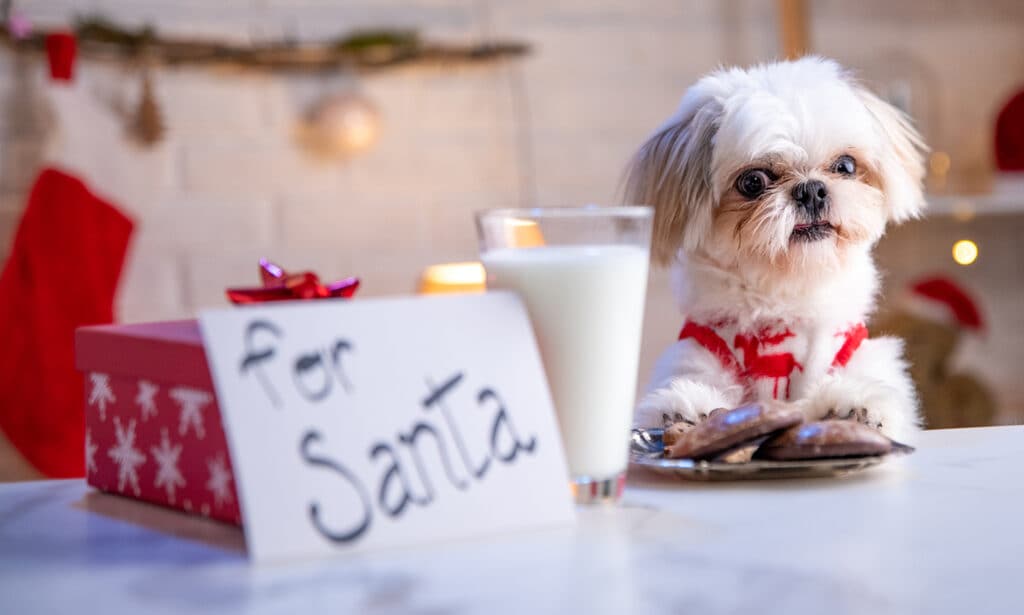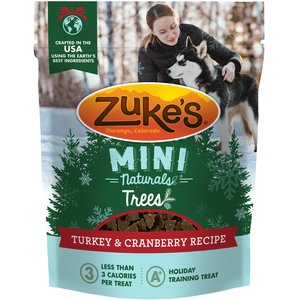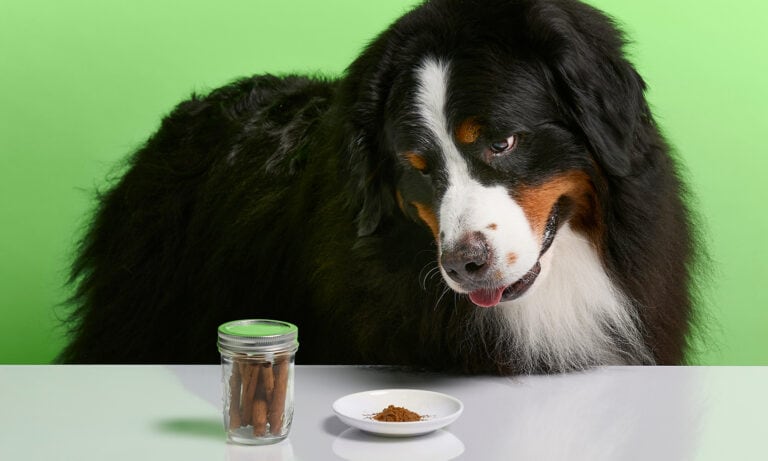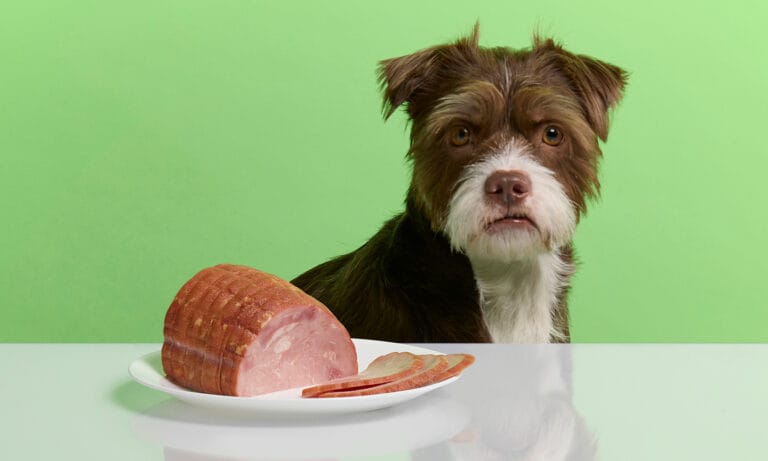The holidays are here! We love this time of year, but between the traveling, festivities and out-of-the-norm excitement, it can also be an extra stressful time of year for pets—not to mention pet owners. But when we pet parents are educated about the holiday foods not to feed dogs, we're much more likely to avert unnecessary disaster.
It's no laughing matter when your fur baby ingests something they shouldn’t, and when they are sick it can really ruin the jolliness of the holiday season. Because there always seems to be some ambiguity around what’s people food is versus what’s pet food, we went straight to the source and consulted veterinarians on what holiday items are big no-nos.
Here are 17 holiday foods not to feed dogs.
Holiday Foods Not to Feed Dogs
Click on a food to learn more.

1Alcohol
Keeping booze away from pets seems like a no-brainer, but at least one or two of us have witnessed an over-imbibed guest at a holiday soiree attempt to sneak Fido a little sip. Funny right? Not even a little.
According to Dr. Douglas Mader, MS, DVM, DABVP (C/F, R/A), DEZCM, a veterinarian in the Florida Keys, feeding alcohol to your pets is not a party trick you want to take a chance on.
The ethanol and hops in beer, wine and liquor cause intoxication, and in large amounts can lead to alcohol poisoning and be deadly.
Dogs who consume alcohol may present with the following symptoms, according to Dr. Mader:
- Vomiting
- Disorientation
- Elevated body temperatures
- Anxiety
- Panting
- Seizures, in severe cases
To make things more complicated, "many dogs are attracted to the sweet taste and smell [of alcohol]," says Dr. Alison Birken, DVM, owner of Victoria Park Animal Hospital in Fort Lauderdale, Florida. Keep an eye on your dog, and keep alcohol well out of reach.
2Bread Dough
Less than 1 teaspoon of bread dough probably won’t cause issues, but anything more than that can be deadly, says Dr. Mader.
The yeast in dough continues to rise in a dog’s stomach, causing potentially deadly pressure and bloating. On top of that, rising yeast also releases ethanol and leads to the same symptoms as those listed above for alcohol poisoning.
As if internal pressure and ethanol poisoning isn't enough, allergies are also an issue here. Many dogs are allergic to dough ingredients (namely wheat), and bread additives (like raisins) can also be toxic, Dr. Mader says.
3Buttery Foods
Buttery human foods aren't the worst offenders when it comes to holiday foods not to feed dogs. However, they aren’t totally benign, says Dr. Mader.
While not toxic, butter is high in fat and cholesterol. Just as in people, moderation is key, and it is best not to deliberately feed it to your pet.
Consuming rich and fatty foods in general can cause problems in dogs, Dr. Birken adds. These problems range from an upset stomach to more serious illnesses such as pancreatitis, which can cause pain, vomiting and dehydration.
4Chocolate and Candy
Most pet owners are privy to the fact that chocolate is a huge no-no, and here’s why: Chocolate contains a molecule called theobromine, which is highly toxic even in small amounts—especially to small dogs. In extreme cases, chocolate consumption can lead to heart arrhythmias and be fatal.
If a dog gets into chocolate, take them to the emergency vet immediately, says Dr. Mader. Supportive care, including induced vomiting and heart medications, may be needed.
Symptoms of chocolate toxicity include:
- Vomiting
- Diarrhea
- Rapid breathing
- Elevated heart rate
- Seizures
Candy canes, cookies, popcorn, cranberry garlands and candy in general are tempting for canines but can have serious consequences such as intestinal obstructions and upset stomach, adds Dr. Birken.
And just because a candy is sugar-free doesn't mean it's safe. Xylitol, which is occasionally found in sugar-free candy or gum, is highly toxic in pets, says Dr. Nicole Savageau, a veterinarian with The Vets.
5Citrus Fruits
While technically not toxic to dogs, citrus fruits—including dried citrus fruits—can be dangerous when eaten in excess, warns Dr. Mader.
If your dog wolfs down a small piece of orange or a wedge of lemon, they'll probably be fine. But if they eat too much, they may get an upset stomach and/or indigestion. They may also experience skin and eye irritation due to the psoralen and limonene compounds found in citrus.
6Coffee and Caffeine
Caffeine consumption in dogs has the same effect as chocolate (see above), and caffeine can raise blood pressure and cause fatal cardiac arrhythmia, says Dr. Savageau.
The amount of caffeine that can cause toxicity depends on the size of the dog; how much caffeine is consumed; and the concentration of the caffeine, according to Dr. Mader. For example, if a 15-pound dog were to eat just 3 teaspoons of instant coffee, they would develop mild toxicity, while 10 teaspoons could be fatal.
So while a quick lick from a coffee mug is probably not an issue, if your dog has any more than that, take note of how much and what type of coffee your dog consumed, then take them to the vet or call the Pet Poison Helpline at Helpline at 855-764-7661.
7Eggnog and Other Dairy Products
Creamy foods and beverages are tasty for humans and pets—but are strictly off-limits for dogs, as they can trigger food allergies and cause diarrhea and other digestive problems, says Dr. Savageau.
Eggnog in particular is a toxic cocktail for pups due to the raw eggs and nutmeg.
Raw eggs can cause poisoning from bacteria, like salmonella or E.coli.
Nutmeg contains a compound called myristicin, which is toxic to dogs and can cause dry mouth, stomach upset, abdominal pain and disorientation, says Dr. Mader.
You can, however, make a dog-friendly eggnog this holiday season!
8Fatty Skin and Meat
File fatty foods and turkey skin (especially fried meats) under scary holiday foods not to feed your dog, please. These are highly toxic and leave your pet susceptible to a kind of inflammation called pancreatitis, according to Dr. Mader.
Pancreatitis produces excessive digestive enzymes that swiftly damage a dog’s intestinal tract—and, if not treated aggressively at a vet, death is likely, warns Dr. Mader. Symptoms include uncontrollable vomiting and extreme pain.
9Grapes and Raisins
Grapes and raisins are some of the scariest foods on our list because they can cause acute kidney failure that can come on quickly and lead to death, says Dr. Savageau.
A reaction to grapes or raisins can be hard to predict, warns Dr. Savageau. Even if your dog has eaten them in the past, that doesn’t mean they won’t have a future problem.
It also doesn’t take a high dose to cause a response, and Dr. Mader reports that, in some cases, dogs have had fatal reactions to as little as one grape.
According to Dr. Mader, the signs of kidney failure brought about by the ingestionion of grapes and raisins include:
- Diarrhea
- Vomiting
- Abdominal pain
- Dehydration
- Weakness
- Low urine output
10Ham
Ham, especially canned ham, contains super-high levels of sodium. This meat also falls under the Fatty Skin and Meat category.
According to Dr. Mader, canine consumption of ham can lead to:
- Vomiting
- Diarrhea
- Weakness
- Seizures
- Kidney damage
- Pancreatitis (see "Fatty Skin and Meat" section above)
All this to say: "Keep the dog away from the ham!" Dr. Mader says.
11Mashed Potatoes and Gravy
Plain, cooked potatoes are safe for your dog, but us humans love to fill our holiday mash with spices, herbs, butter and sour cream, and slather it with meat gravy. All of these extras are where we start to get into the risk of pancreatitis and the other issues listed above under Buttery Foods and Fatty Skin and Meat.
Plus, raw potatoes contain a compound called solanine that can be toxic and lead to potato poisoning, according to Dr. Mader.
12Meat Bones
Soft bones like rib bones—or bones from fish or poultry—can splinter when chewed and cause impactions and lacerations to the esophagus, stomach and intestinal tract, says Dr. Mader.
So it seems turkey bones are not on the menu for your pup’s holiday meal—but if you are going to give your dog a bone, make it a large, hard bone. Dr. Mader says hard bones that come from beef are generally safe, so long as they are fresh.
Or, play it on the extra-safe side and give your dog a Bones & Chews roasted marrow bone.
13Nuts
Nuts—and especially macadamia nuts, which are prevalent in holiday cooking—are off limits to dogs, not only because of the high fat content, but also due to the possibility of mold contamination, says Dr. Mader. Even a small amount of any kind of nuts can kill a dog.
Typical signs that your dog may be sick after eating nuts are:
- Vomiting
- Diarrhea
- Fever
- Restlessness
14Onions, Garlic and Chives
Onions, garlic and chives are Alliums: a plant genus that contains N-propyl disulfide, which can impact a dog’s red blood cells and cause life-threatening anemia, says Dr. Mader.
Symptoms of onion toxicity or poisoning in dogs include:
- Vomiting
- Diarrhea
- Weakness or tiredness
- Pale gums
- Loss of appetite
- Jaundice
- Red or brown urine
- Racing heart
- Panting
In severe cases, consuming onions in any form can be fatal for dogs.
Canine consumption of Alliums often necessitates emergency blood transfusions at the vet.
15Pumpkin Pie
Pumpkin pie contains many of the unsafe ingredients discussed above—including sugar, spices and dairy—that can cause diarrhea, vomiting and gastrointestinal distress.
Pumpkin, in general, can also have a laxative effect, according to Dr. Mader.
A tiny lick of pumpkin pie is probably OK, but anything more than that can cause issues, says Dr. Mader.
Better to be safe than sorry and keep your pup away from pumpkin pie completely.
16Salt and Salty Snacks
Salt in itself is not toxic, and dogs actually do need a certain amount of salt to be healthy, according to Dr. Mader.
But we all know that dogs are not the masters of moderation—and people food, like salty snack mixes, are loaded with sodium that can cause gastrointestinal upset, vomiting, diarrhea, dehydration and more in dogs.
Keep the Chex Mix as far out of your dog’s reach as possible this holiday season.
17Stuffing
Dogs should never eat turkey stuffing, Dr. Mader warns.
Stuffing consists of bread, butter, onions and various spices that can cause major problems for your dog (covered above).
Canine consumption of holiday stuffing will likely cause gastrointestinal problems and even death.
What To Do If Your Dogs Eats Toxic Foods
If, at any point, your dog consumes something harmful on this list or exhibits signs of illness and/or symptoms listed below, consult your veterinarian immediately or take them to the nearest veterinary or pet emergency clinic.
You can also call the ASPCA Pet Poison Control Center at (888) 426-4435 for advice or get timely advice from our licensed veterinary team and leave with a personalized consult report by clicking into Chewy's Connect With a Vet live online chat program.
How to Keep Your Dog Safe From Holiday Foods They Shouldn’t Eat
So, how do we keep our dogs safe from all of the holiday foods they shouldn’t eat? The best course of action is to be diligent about keeping items out of their reach.
However, any pet parent knows dogs can easily pull a Houdini when there’s something they want. Giving them a holiday treat or two before they are tempted to steal people food is a smart action to take.
Some of our favorite holiday treats for dogs are:
Temporarily out of stock
Temporarily out of stock
Temporarily out of stock
Share:



















